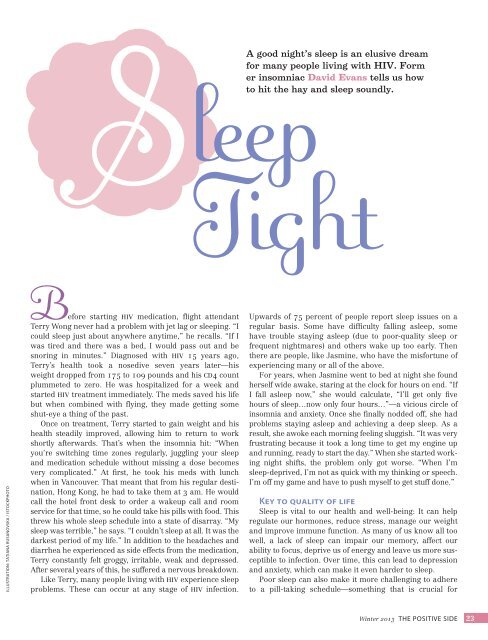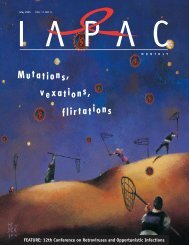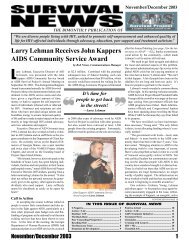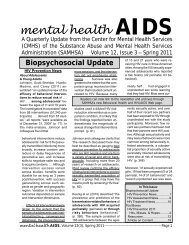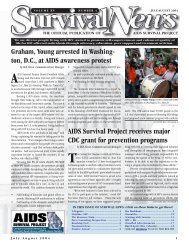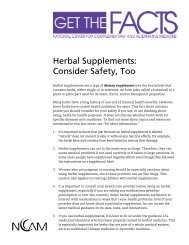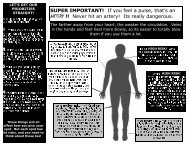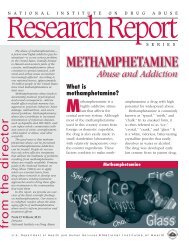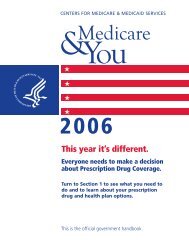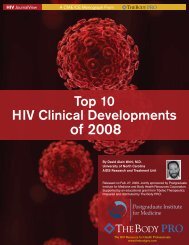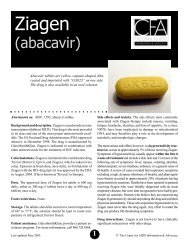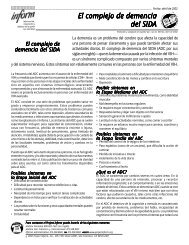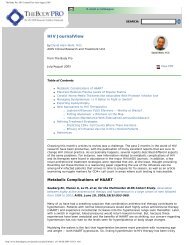The Positive Side (Winter 2013) - CD8 T cells - The Body
The Positive Side (Winter 2013) - CD8 T cells - The Body
The Positive Side (Winter 2013) - CD8 T cells - The Body
Create successful ePaper yourself
Turn your PDF publications into a flip-book with our unique Google optimized e-Paper software.
ILLUSTRATION: TATIANA RUSANOVSKA / ISTOCKPHOTO<br />
A good night’s sleep is an elusive dream<br />
for many people living with HIV. Form<br />
er insomniac David Evans tells us how<br />
to hit the hay and sleep soundly.<br />
Sleep<br />
Tight<br />
Before starting HIV medication, flight attendant<br />
Terry Wong never had a problem with jet lag or sleeping. “I<br />
could sleep just about anywhere anytime,” he recalls. “If I<br />
was tired and there was a bed, I would pass out and be<br />
snoring in minutes.” Diagnosed with HIV 15 years ago,<br />
Terry’s health took a nosedive seven years later—his<br />
weight dropped from 175 to 109 pounds and his CD4 count<br />
plummeted to zero. He was hospitalized for a week and<br />
started HIV treatment immediately. <strong>The</strong> meds saved his life<br />
but when combined with flying, they made getting some<br />
shut-eye a thing of the past.<br />
Once on treatment, Terry started to gain weight and his<br />
health steadily improved, allowing him to return to work<br />
shortly afterwards. That’s when the insomnia hit: “When<br />
you’re switching time zones regularly, juggling your sleep<br />
and medication schedule without missing a dose becomes<br />
very complicated.” At first, he took his meds with lunch<br />
when in Vancouver. That meant that from his regular destination,<br />
Hong Kong, he had to take them at 3 am. He would<br />
call the hotel front desk to order a wakeup call and room<br />
service for that time, so he could take his pills with food. This<br />
threw his whole sleep schedule into a state of disarray. “My<br />
sleep was terrible,” he says. “I couldn’t sleep at all. It was the<br />
darkest period of my life.” In addition to the headaches and<br />
diarrhea he experienced as side effects from the medication,<br />
Terry constantly felt groggy, irritable, weak and depressed.<br />
After several years of this, he suffered a nervous breakdown.<br />
Like Terry, many people living with HIV experience sleep<br />
problems. <strong>The</strong>se can occur at any stage of HIV infection.<br />
Upwards of 75 percent of people report sleep issues on a<br />
regular basis. Some have difficulty falling asleep, some<br />
have trouble staying asleep (due to poor-quality sleep or<br />
frequent nightmares) and others wake up too early. <strong>The</strong>n<br />
there are people, like Jasmine, who have the misfortune of<br />
experiencing many or all of the above.<br />
For years, when Jasmine went to bed at night she found<br />
herself wide awake, staring at the clock for hours on end. “If<br />
I fall asleep now,” she would calculate, “I’ll get only five<br />
hours of sleep…now only four hours…”—a vicious circle of<br />
insomnia and anxiety. Once she finally nodded off, she had<br />
problems staying asleep and achieving a deep sleep. As a<br />
result, she awoke each morning feeling sluggish. “It was very<br />
frustrating because it took a long time to get my engine up<br />
and running, ready to start the day.” When she started working<br />
night shifts, the problem only got worse. “When I’m<br />
sleep-deprived, I’m not as quick with my thinking or speech.<br />
I’m off my game and have to push myself to get stuff done.”<br />
KeY to quAlitY oF liFe<br />
Sleep is vital to our health and well-being: It can help<br />
regulate our hormones, reduce stress, manage our weight<br />
and improve immune function. As many of us know all too<br />
well, a lack of sleep can impair our memory, affect our<br />
ability to focus, deprive us of energy and leave us more susceptible<br />
to infection. Over time, this can lead to depression<br />
and anxiety, which can make it even harder to sleep.<br />
Poor sleep can also make it more challenging to adhere<br />
to a pill-taking schedule—something that is crucial for<br />
<strong>Winter</strong> <strong>2013</strong> THE POSITIVE SIDE<br />
23


